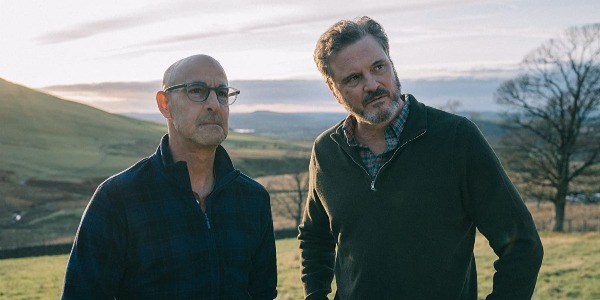PIECES OF A WOMAN: Nurturing Life & Facing Death
It has been a long time since I’ve seen a movie about marriage and relationships in crisis that really blew me away. Marriage Story was almost completely inert. Abel Ferrara’s Tommaso had some pulse to it, mostly because unlike Noah Baumbach who is overly careful not to disparage his own name, Ferrara proudly displays open self-inflicted wounds. Charlie Kaufmann’s I’m Thinking of Ending Things was definitely my cup of tea but suffer from the issue that has plagued Kaufmann’s entire screenwriting career – he can’t end a story. Right before 2020 ended, however, Kornél Mandruczó’s Pieces of a Woman released and ended my streak of having to watch below-the-mark relationship trauma-dramas. This movie is remarkable and depending on how you choose to treat its ‘release’, it’s either the final great film of 2020 or the first masterwork of 2021.
Picking Up The Pieces
Mandruczó’s films present a metaphorical portrait of not just life from a human experience but from a universal connection of all living and dead entities, mostly through symbolic, biblical representation. Pieces of a Woman, just like Jupiter’s Moon and White God, is bursting at the seams with metaphor. That doesn’t mean it isn’t grounded in an aching realism, however. Rather, the metaphor is what firmly supplements the tragic real experiences of Martha (Vanessa Kirby), a woman who is left to pick up the pieces of a tragic home-birth which resulted in the death of her newborn daughter. To her, like many women, the loss of a child generally is coped with finding something else – ideally, something living – to care for and nurture. Throughout her existence thereafter, left to cope with the pain and remorse of what cannot be undone, Martha spends a lot of her alone time preoccupied with apples. She buys them at the supermarket, reads about them, and readies their seeds to be planted via ‘cold stratification’ in her refrigerator.

For Martha’s husband Sean (Shia LeBeouf), the aftermath of tragedy is a fight to salvage dignity. This is framed as a masculine, salt-of-the-earth response that results in lashing out, bullying, and eventually, infidelity. It’s quite disturbing to watch LeBeouf in this performance particularly because he gives a good one and it’s one he was filming for shortly before his own domestic abuse towards his real-life partners was revealed. Here he plays someone who engages in forceful but quickly self-correcting “boorishness” by his own admission. His character is not only an archetypal gendered opposite of the grieving, suffering Martha, but a class opposite of Martha’s mother Elizabeth (Ellen Burstyn), with who he has irreconcilable differences in behavior and economics, but similarities in their myopic belief in revenge and comeuppance. They conspire to convict Martha’s home-birth caretaker Eva (Molly Parker) as responsible for the baby’s death even though Martha objects to the whole proceeding and simply wants to be left alone.
Living in a Different Reality
Pieces of a Woman brilliantly portrays the feeling of witnessing the world continue to turn as one’s own life has staggered to a halt. There are so many scenes where Martha’s mere existence disrupts the environment and tilts the frames. Working for the first time with cinematographer Benjamin Loeb, Mandruczó’s film is less dynamic in its shots and editing than his previous films, but we still see his signature floating and gliding observational camerawork nonetheless, especially in the film’s nail-biting opening birthing sequence, which plays almost like a classic opening Overture but with human moans and screams. Many sequences in the movie concentrate decidedly on Martha, bobbing and weaving in and out of the conversations and arguments that other members of her family are having. Vanessa Kirby commands the screen with her performance and Mandruczó makes sure that we are feeling just as lost and restless watching her as she is surrounded by people who supposedly ‘love’ her. The film’s visual style evokes the deep discomfort that Martha feels from no longer living in the same plane of reality as everyone else.

Even Sean, who shares in the tragedy but in his own way, chooses to blend as best he can back into the world. Martha rejects it, to the chagrin of almost everyone, especially her overbearing mother, who lectures and condescends her to ‘stick up for herself’ as if grieving in her own way, taking on the burden at her own choosing is not enough evidence of her strength. No, someone needs to pay. The politics of Pieces of a Woman come from its direct aim at the heart of American arrogance and thirst for vengeance. America is after all one of the only developed countries on Earth with a death penalty, and the only one which executes at such a ruthless volume, an average of 25 executions per year.
Conclusion
The media and public frenzy to ruin Eva’s life – which we experience in the movie only through newsreels, printed articles, and off-screen crowd commotion – is depicted as deliberate, unfeeling, and procedural. This is where Mandruczó’s metaphors come clashing with the harsh American judicial system which knows nothing but the literality of blame and punishment. When a lawyer asks Martha what the baby felt like when she held her, Martha says she “smelled like an apple” which confuses the courtroom. Of course, they wouldn’t have any idea what she was talking about, they don’t live in her reality.
Have you seen Pieces of A Woman? What did you think? Let us know in the comments below!
Pieces of A Woman is currently streaming on Netflix.
Watch Pieces of A Woman
Does content like this matter to you?
Become a Member and support film journalism. Unlock access to all of Film Inquiry`s great articles. Join a community of like-minded readers who are passionate about cinema – get access to our private members Network, give back to independent filmmakers, and more.
Join now!





